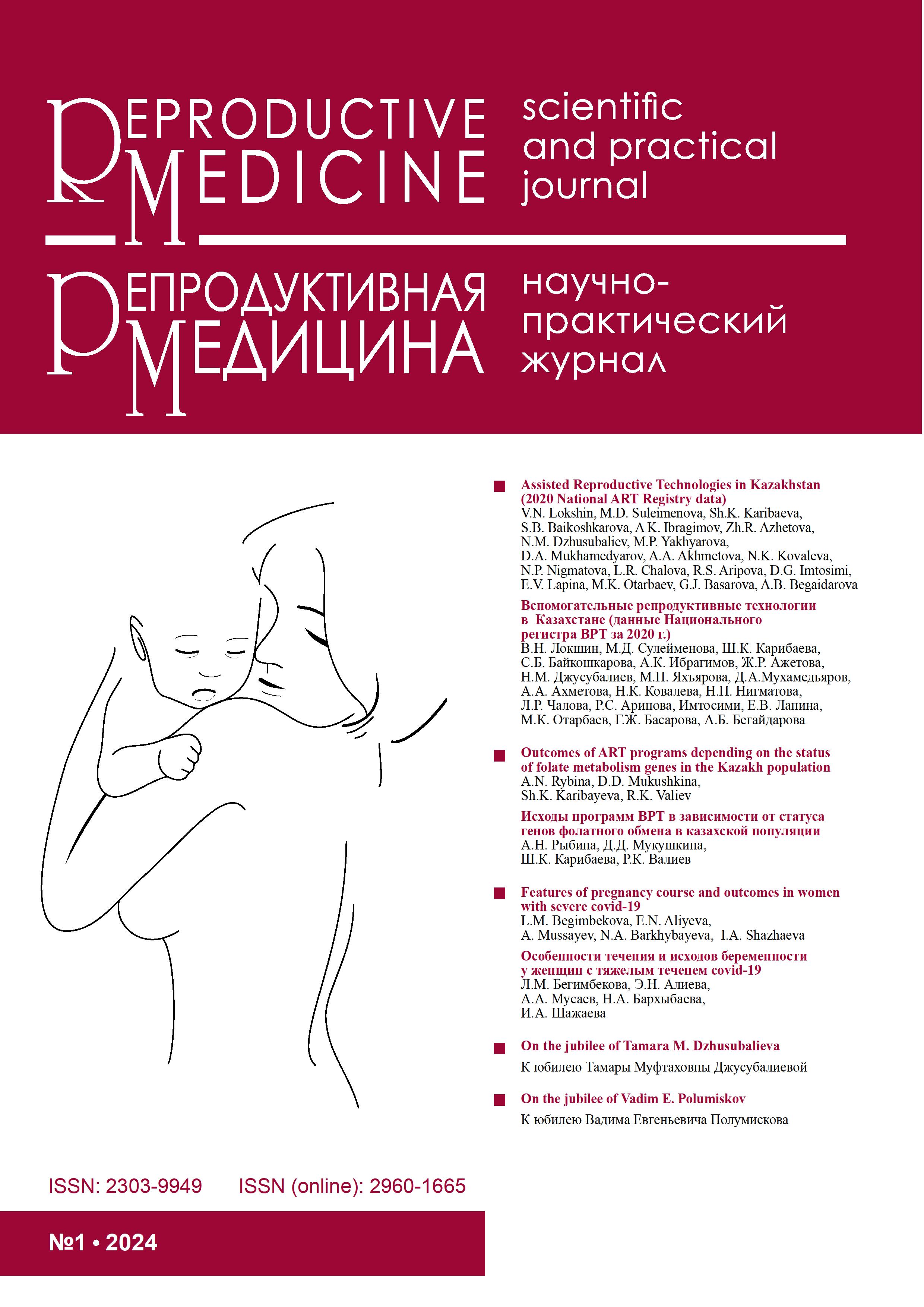Modern aspects of intrauterine correction of fetus developmental defects: А literature review
DOI:
https://doi.org/10.37800/RM.1.2024.103-112Keywords:
Fetal surgery, fetal therapy, pregnancy, tocolysis, mother, congenital anomaliesAbstract
Relevance: Fetal surgery is an operation to open the uterine cavity, surgically correct fetal abnormalities, and return the fetus to the uterus for postoperative recovery and continuation of gestational development. Over the past 45 years, fetal surgery has become a recognized field of innovative surgery. Huge progress has been made in understanding the natural history and pathophysiology of fetal diseases, solving technical problems of fetal surgery, intra- and postoperative care, and monitoring the mother-fetus separation. However, the success and widespread use of fetal surgery is still limited by several unresolved severe issues. Fetal therapy is a logical continuation of fetal diagnosis. The diseases that could potentially be corrected by treating the fetus include fetal urinary disorders.
The study aimed to review the results of invasive fetoscopic interventions and identify modern approaches to the timely and effective correction of intrauterine developmental defects to reduce negative perinatal and maternal consequences.
Materials and Methods: The literature review included domestic (eLibrary, CyberLeninka.ru ) and foreign articles and recommendations (PubMed, Cochrane Library) published in Russian and English over the past 10 years.
Results: Surgery on a baby before birth may seem like science fiction, but prenatal surgery is becoming more common. Fetoscopic surgery allows providing intrauterine care to pregnant women with multiple pregnancies with severe complications. Fetal aortic valvuloplasty can stop the progression of aortic stenosis in mid-pregnancy and reduce the development of hypoplastic left heart syndrome. One of the most exciting developments in human fetal surgery has been the study of wound healing in fetal skin without scarring.
Conclusion: Fetal surgery is a new field that is developing rapidly, and modern methods of antenatal correction can change the natural course and outcome of the disease. However, some differences still need to be resolved. Standardized assessment tools and fetal blood microsampling methods must be developed to ensure further development of clinical protocols. In this regard, the study of the experience of leading centers is extremely relevant for Kazakhstani specialists.
References
Oliver JD, Jia S, Halpern LR, Graham EM, Turner EC, Colombo JS, Grainger DW, D'Souza RN. Innovative Molecular and Cellular Therapeutics in Cleft Palate Tissue Engineering. Tissue Eng Part B Rev. 2021;27(3):215-237.
https://doi.org/10.1089/ten.TEB.2020.018
Gimenez A, Kopkin R, Chang DK, Belfort M, Reece EM. Advances in Fetal Surgery: Current and Future Relevance in Plastic Surgery. Semin Plast Surg. 2019;33(3):204-212.
https://doi.org/10.1055/s-0039-1693431
Karamlou T, Giraud GD, McKeogh D, Jonker SS, Shen I, Ungerleider RM, Thornburg KL. Right ventricular remodeling in response to volume overload in fetal sheep. Am J Physiol Heart Circ Physiol. 2019;316(5):H985-H991.
https://doi.org/10.1152/ajpheart.00439.2018
Graf K, Kohl T, Neubauer BA, Dey F, Faas D, Wanis FA, Reinges MH, Uhl E, Kolodziej MA. Percutaneous minimally invasive fetoscopic surgery for spina bifida aperta. Part III: neurosurgical intervention in the first postnatal year. Ultrasound Obstet Gynecol. 2016;47(2):158-161.
https://doi.org/10.1002/uog.14937
Башмакова Н.В., Косовцова Н.В. Фетальная хирургия: достижения и проблемы // Доктор.Ру. 2017;13(142):31-36.
Bashmakova NV, Kosovcova NV. Fetal surgery: achievements and problems. Doktor.Ru. 2017;13(142):31-36. (in Russ.). https://journaldoctor.ru/upload/iblock/3b3/5-2017-13-14.pdf
Miller JL, Groves ML, Baschat AA. Fetoscopic spina bifida repair. Minerva Ginecol. 2019;71(2):163-170.
https://doi.org/10.23736/S0026-4784.18.04355-1
Костюков К.В., Гладкова К.А., Сакало В.А., Шмаков Р.Г., Тетруашвили Н.К., Гус А.И. Медицина плода: обзор литературы и опыт Национального медицинского исследовательского центра акушерства, гинекологии и перинатологии имени академика В.И. Кулакова. Доктор.Ру. 2019;11(166):35-43.
Kostjukov KV, Gladkova KA, Sakalo VA, Shmakov RG, Tetruashvili NK, Gus AI. Fetal medicine: A literature review and experience of Academician V.I. Kulakov National Medical Research Center for Obstetrics, Gynecology and Perinatology. Doktor.Ru. 2019;11(166):35-43. (in Russ.).
https://doi.org/10.31550/1727-2378-2019-166-11-35-43
Quintero R.A., Chmait R.H., Kontopoulos E.V. Laser treatment of twin-twin transfusion syndrome: what do the data really show? Am J Obstet Gynecol. 2013;209(2):157–158.
https://doi.org/10.1016/j.ajog.2013.03.018
Чернов А. Хирургия плода. Александр Чернов о метальных вмешательствах, которые спасают жизни и улучшают прогноз. Катрен Стиль. 2015;139.
Chernov A. Fetal surgery. Alexander Chernov about metal interventions that save lives and improve the prognosis. Katren Stil'. 2015;139. (in Russ.).
https://www.katrenstyle.ru/spotlight/hirurgiya_ploda
Chmait RH, Monson MA, Pham HQ, Chu JK, Speybroeck A, Chon AH, Kontopoulos EV, Quintero RA. Percutaneous mini laparotomy fetoscopic repair of open spina bifida: a novel surgical technique. Am J Obstet Gynecol. 2022;227(3):375-383.
https://doi.org/10.1016/j.ajog.2022.05.032
Vergote S, Lewi L, Gheysen W, De Catte L, Devlieger R, Deprest J. Subsequent fertility, pregnancy, and gynecologic outcomes after fetoscopic laser therapy for twin-twin transfusion syndrome compared with normal monochorionic twin gestations. Am J Obstet Gynecol. 2018;218(4):447.e1-447.e7.
https://doi.org/10.1016/j.ajog.2018.01.013
Evans LL, Harrison MR. Modern fetal surgery - a historical review of the happenings that shaped modern fetal surgery and its practices. Transl Pediatr. 2021;10(5):1401-1417.
https://doi.org/10.21037/tp-20-114
Friedman KG, Tworetzky W. Fetal cardiac interventions: Where do we stand? Arch Cardiovasc Dis. 2020;113(2):121-128.
https://doi.org/10.1016/j.acvd.2019.06.007
Marshall AC, Der Velde ME, Tworetzky W, Gomez CA, Wilkins-Haug L, Benson CB, Jennings RW, Lock JE. Creation of an atrial septal defect in utero for fetuses with hypoplastic left heart syndrome and intact or highly restrictive atrial septum. Circulation. 2004;110(3):253-258.
https://doi.org/10.1161/01.CIR.0000135471.17922.17
Schidlow DN, Tworetzky W, Wilkins-Haug LE. Percutaneous fetal cardiac interventions for structural heart disease. Am J Perinatol. 2014;31(7):629-636.
https://doi.org/10.1055/s-0034-1383884
Friedman KG, Sleeper LA, Freud LR, Marshall AC, Godfrey ME, Drogosz M, Lafranchi T, Benson CB, Wilkins-Haug LE, Tworetzky W. Improved technical success, postnatal outcome and refined predictors of outcome for fetal aortic valvuloplasty. Ultrasound Obstet Gynecol. 2018;52(2):212-220.
https://doi.org/10.1002/uog.17530
Pickard SS, Wong JB, Bucholz EM, Newburger JW, Tworetzky W, Lafranchi T, Benson CB, Wilkins-Haug LE, Porras D, Callahan R, Friedman KG. Fetal Aortic Valvuloplasty for Evolving Hypoplastic Left Heart Syndrome: A Decision Analysis. Circ Cardiovasc Qual Outcomes. 2020;13(4):e006127.
https://doi.org/10.1161/CIRCOUTCOMES.119.006127
Guseh SH, Friedman KG, Wilkins-Haug LE. Fetal cardiac intervention – Perspectives from a single center. Prenat Diagn. 2020;40(4):415-423.
https://doi.org/10.1002 pd.5631
Yuan SM, Humuruola G. Fetal cardiac interventions: clinical and experimental research. Postepy Kardiol Interwencyjnej. 2016;12(2):99-107.
https://doi.org/10.5114/aic.2016.59359
Grivell RM, Andersen Ch, Dodd JM. Prenatal interventions for congenital diaphragmatic hernia for improving outcomes. Cochrane Database Syst Rev. 2015;11:CD008925.
https://doi.org/10.1002/14651858.CD008925.pub2
Perrone EE, Deprest JA. Fetal endoscopic tracheal occlusion for congenital diaphragmatic hernia: a narrative review of the history, current practice, and future directions. Transl Pediatr. 2021;10(5):1448-1460.
https://doi.org/10.21037/tp-20-130
Kosinski P, Wielgos M. Congenital diaphragmatic hernia: pathogenesis, prenatal diagnosis and management: A literature review. Ginekol Pol. 2017;88(1):24-30.
https://doi.org/10.5603/GP.a2017.0005
Meller C, Covini D, Aiello H, Izbizky G, Portillo Medina S, Otano L. Update on prenatal diagnosis and fetal surgery for myelomeningocele. Arch Argent Pediatr. 2021;119(3):e215-e228.
https://doi.org/10.5546/aap.2021.eng.e215
Pedreira DA, Zanon N, Nishikuni K, Moreira de Sá RA, Acacio GL, Chmait RH, Kontopoulos EV, Quintero RA. Endoscopic surgery for the antenatal treatment of myelomeningocele: the CECAM trial. Am J Obstet Gynecol. 2016;214(1):111.e1-111.e11.
https://doi.org/10.1016/j.ajog.2015.09.065
Chervenak FA, McCullough LB. The ethics of maternal-fetal surgery. Seminars in Fetal and Neonatal Medicine. 2018;23:64-67.
https://doi.org/10.1016/j.siny.2017.09.008
Rebizant B, Kolenik A, Grzyb A, Chaberek K, Sękowska A, Witwicki J, Szymkiewicz-Dangel J, Dębska M. Fetal Cardiac Interventions- Are They Safe for the Mothers? J Clin Med. 2021;10(4):851.
https://doi.org/10.3390/jcm10040851
Sacco A, Der Veeken L, Bagshaw E, Ferguson C, Mieghem T, David AL, Deprest J. Maternal complications following open and fetoscopic fetal surgery: A systematic review and meta-analysis. Renat Diagn. 2019;39(4):251-268.
Downloads
Published
How to Cite
Issue
Section
License
Copyright (c) 2024 The rights to a manuscript accepted for publication are transferred to the Journal Publisher. When reprinting all or part of the material, the author must refer to the primary publication in this journal.

This work is licensed under a Creative Commons Attribution-NonCommercial-NoDerivatives 4.0 International License.
The articles published in this Journal are licensed under the CC BY-NC-ND 4.0 (Creative Commons Attribution – Non-Commercial – No Derivatives 4.0 International) license, which provides for their non-commercial use only. Under this license, users have the right to copy and distribute the material in copyright but are not permitted to modify or use it for commercial purposes. Full details on the licensing are available at https://creativecommons.org/licenses/by-nc-nd/4.0/.




